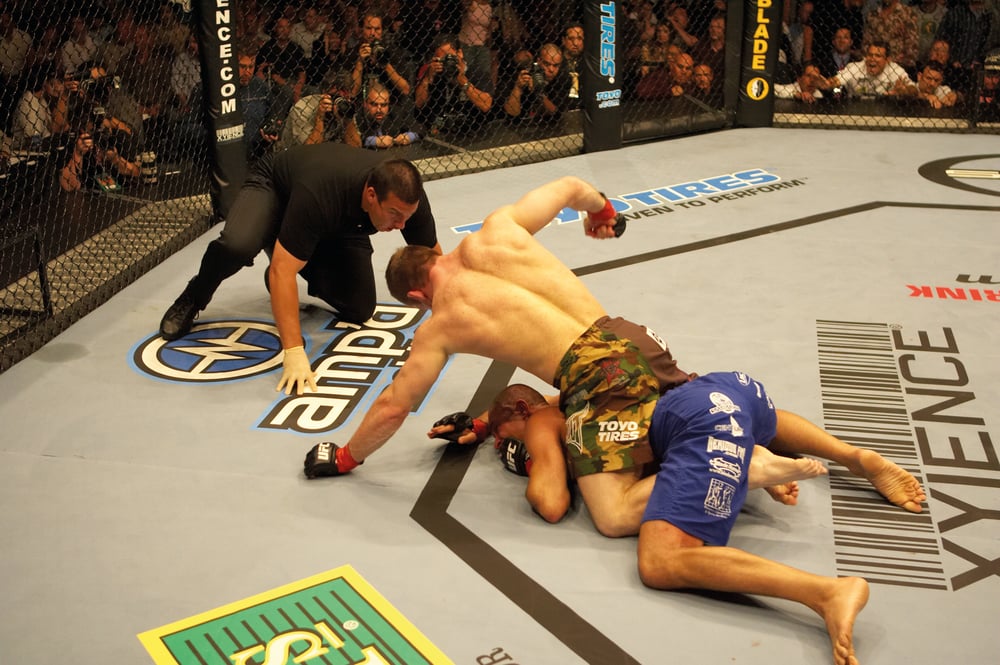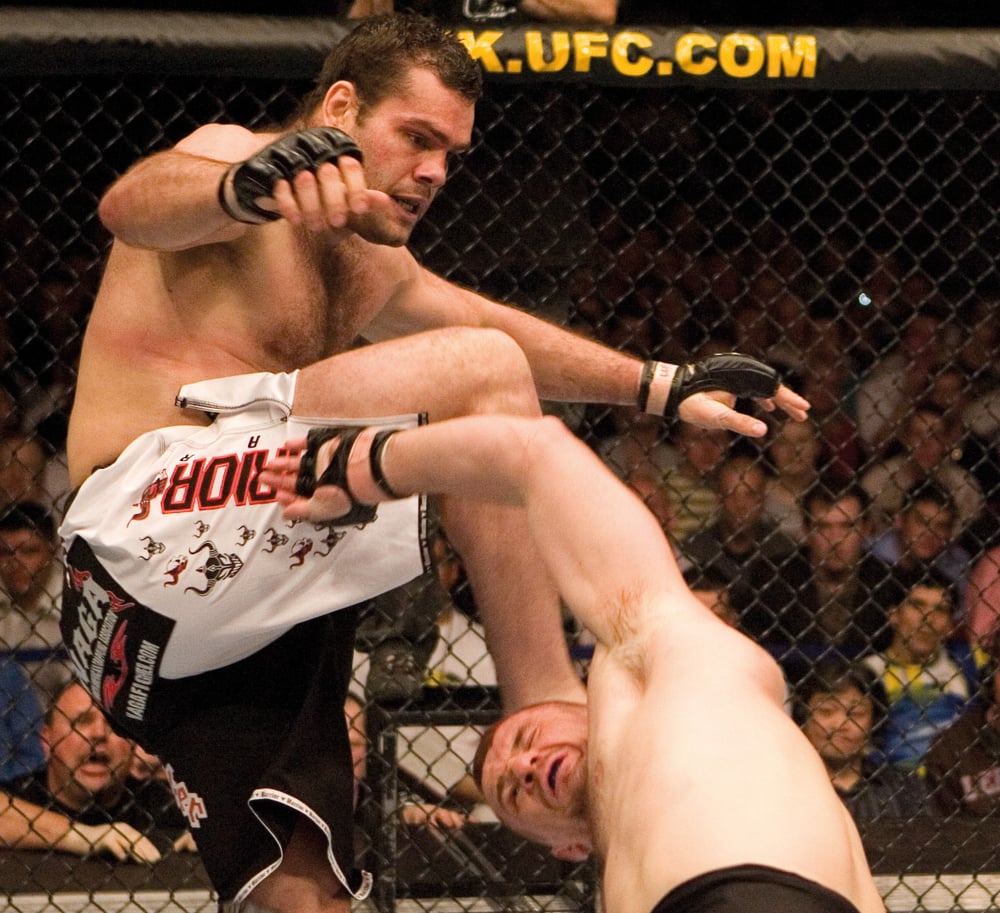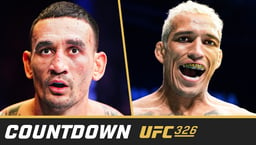
Issue 056
November 2009
Bearded, cardigan-wearing men from universities in Cambridge and Harvard claim that gambling has existed since the dawn of recorded history. It seems that for as long as contests have existed, third parties have always been quick to place wagers on the outcome.
These same men will tell you that wrestling, boxing, and even early forms of mixed martial arts (MMA) predate just about any game involving a ball, bat, or puck. Combative sports are indeed the earliest and purest form of competition. By this logic, one could argue that betting on fights is the earliest and purest form of gambling. The Ancient Romans enjoyed it, as did the Aztecs, the Mongols, and just about everyone else since.
Betting on MMA is truly a unique experience, in that the nature of the sport makes it difficult to consistently pick winners. Casual fans are often shocked by underdogs who seemingly pull a submission or knockout out of nowhere and take the fight. MMA is a dynamic sport, where anything can happen – and that’s exactly where the appeal in gambling lies.
The modern gambler is spoilt for choice, particularly in the USA, where gambling and MMA seem to go hand-in-hand. All it takes is one trip to Las Vegas or Atlantic City to see how popular betting on MMA has become – fight odds on outdoor billboards, next to event promos, in the restaurants and, in some cases, even in toilets. In Las Vegas, betting on MMA (and particularly the UFC) is growing as fast as the sport itself. To some, this is no surprise. After all, Zuffa, the parent company of the UFC, came from a gambling background.
“We came from the casino business,” says Zuffa founder Lorenzo Fertitta of himself and his brother. “My dad came to Vegas and worked his way up in every casino in town as a dealer, and then a pit boss, and then a casino manager, before he started the Station Casino as a place for local people to gamble. We built all our businesses up from there.”
Surprisingly, the Fertitta-managed Station casino has never offered wagers on UFC events, due to a possible perceived conflict of interests. However, just about every other casino, hotel and sports book in Vegas has jumped on the bandwagon. For years, odds makers were hesitant, only offering wagers on main events. But as the sport increased in popularity, so did the demand for odds on undercard fights - the industry had no choice but to respond, according to Hilton sports book director, Jay Kornegay. “MMA is definitely the fastest-growing betting sport that we have,” says Kornegay. “The total bets on a weekend UFC card would equal a good NFL game. It’s even overtaken NASCAR.”

While a significant amount of money is made through wagers placed in the ‘real world’, the business has also taken off online. Just about every gambling website now offers a UFC / MMA section on their sports book. Both casual fans and hardcore enthusiasts are taking part as MMA gains further mainstream exposure and acceptance.
“More and more we see bets coming from casual fans,” says Kornegay. “The majority of them tend to place money on heavy favorites – names that they’ve heard of, like Brock Lesnar and Chuck Liddell. We definitely see an increase in bets when one or more of the big stars are on a card.”
It’s these uninformed, casual bets that allow the hardcore gamblers to make a killing, according to an anonymous MMA insider. During the day, Mr X (our insider) is involved in the organization and promotion of premiere MMA events. Over time, an increasingly larger share of his income has been the result of betting on MMA. Mr X has agreed to share some of his betting strategies under one condition – complete anonymity.
“There are two popular schools of thought,” says Mr X. “One is to consistently place small wagers on the underdogs. Over time, you’ll end up on top. The other is to only bet on main-card favorites as soon as the odds are released, so you can maximize winnings. Personally, I think both of these strategies are seriously flawed. If you want to make money, you have to become a student of the sport, simple as that.”
If it were possible to get a degree in MMA betting, Mr X would be the sole holder of a PhD. He is an MMA addict who follows developments and matchmaking on a daily basis. The insider treats gambling as a precise science; no bet is placed without consulting records, graphs, training blogs and even the opinions of those close to the fighters.
“What people don’t understand is that the odds are there to make money for the house,” says Mr X. “If you get suckered into making a stupid bet because the odds look good, you’re going to lose money. At the end of the day, the mission is simple: Pick the winners. You do your research, pick a winner based on that research, and then find a book that offers you the best odds. A lot of people do it the other way around; they make a decision based on what the odds are. It’s stupid.”

Mr X has a rare knack for picking winners, going as far back as UFC 58, where he chose Mark Hominick over former lightweight king, Yves Edwards. But even an MMA addict makes mistakes. “I lost a ton of money on Cro Cop vs Gonzaga,” says Mr X. “But you have to be prepared to lose money in this game. Just make sure it’s never more than you can afford.” As MMA (and particularly the UFC) grows, so will all peripheral activities, such as gambling on MMA. While the hardcore enthusiasts such as Mr X have an in-depth understanding of the sport, it’s the casual fans that will push MMA and all peripheral activities into the mainstream.
But before that can happen, MMA, and especially the UFC, must produce stars. Until a UFC champion can stand next to the likes of Tiger Woods, Kobe Bryant or Peyton Manning, the sport will always be one step short of the mainstream – and so will betting on MMA.
The casual fan places a bet on Georges St Pierre not because he sees a hole in the ground game of his opponent, or because he believes St Pierre’s athleticism will be the key to the fight. Rather, a casual fan places the bet because he’s familiar with him – he has watched the countdown show, and he has seen St Pierre’s face in magazines. In short, he’s betting on GSP’s star-like status.
Mr X couldn’t agree more. “Just look at what happened when Matt Hughes fought Royce Gracie,” says Mr X. “Even odds! It was utter insanity! But the casual fans were putting their money on Gracie because of his whole legendary persona. Anyone with half a brain knew Gracie was going to lose!”
Like any other form of gambling, betting on MMA has its dangers. While it may not have the same history of corruption and fight fixing as boxing, irresponsible betting transcends sports and ruins lives. So for all the gamblers out there (both hardcore and casual), please gamble responsibly. Always remember that, in the end, the house always wins – unless you’re Mr X of course.

THE ODDS EXPLAINED
While sports betting is generally based on point spreads, MMA odds are based on what are called money lines.
Example:
UFC Champion -300
UFC Title Contender +200
In this scenario, the UFC champion is the fan favorite, therefore the sports books have him listed as -300. This simply means that for every $300 dollars you place on him, you can win back $100. Therefore, a modest bet of $30 means one will take home $40 (30 wagered plus 10 won), should the champion retain his title.
The title contender is the clear underdog in this case, with odds set at +200. Every bet of $100 will win $200.
The odds are set up using a string of mathematical formulas. Over time, they will shift depending on how many bets are placed on each fighter. Often those betting on favorites prefer to place bets as early as possible, before the odds have a chance to shift. In the end, the house will maintain a balance in the number of bets placed. This ensures that the sports book takes a nice tidy profit, regardless of the outcome.
It’s very common for the odds to change from website to website, as sports books try to entice new bettors. BestFightOdds.com provides the MMA fan with a list of updated odds from nine different sports books, allowing gamblers to compare money lines.
...









